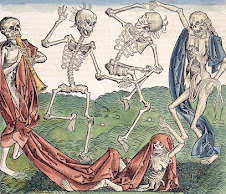Thursday, January 31, 2008
Every character in the book had to talk about their father, of which family lineage they are from, before they can identify themselves. The story seems to take place in a land where fame and reputation are carried on and uphold from one to another. Hrothgar would first recognize Beowulf's father and his accomplishments before he recognizes Beowulf--and Hrothgar, among others, expect Beowulf to stand up to such reputation.
We can also identify how "worthy" a person from the book is, by the amount of goods they carry.
Beowulf brings some weapons on shore before fighting for Hrothgar, yet after every fight, his possessions become more expensive as with his fame. Although he returned to his home with them, he was yet again prized for his voyage to help Hrothgar. His fame back home is less, but still plentiful.
During the fight with the dragon, Wiglaf mentioned once "he considered us worthy of glory, and gave me these treasures..." (69) relating how goods were a symbol of power, and responsibility and fame.
Lastly, among the burials, plenty of goods were buried along were the person to be famous. ie.) Beowulf's burial was 'bigger' than his father's.
I relate fame to possession of goods.
I question the idea of bloodline where goods and fame and loyalty are "supposed" to be passed on from one generation to the next. Why does the author think that a hero must be heroic and powerful? is it related to the part of the thinking of the medieval era, where everyone needs to do good deed, or they would be damned?
We can also identify how "worthy" a person from the book is, by the amount of goods they carry.
Beowulf brings some weapons on shore before fighting for Hrothgar, yet after every fight, his possessions become more expensive as with his fame. Although he returned to his home with them, he was yet again prized for his voyage to help Hrothgar. His fame back home is less, but still plentiful.
During the fight with the dragon, Wiglaf mentioned once "he considered us worthy of glory, and gave me these treasures..." (69) relating how goods were a symbol of power, and responsibility and fame.
Lastly, among the burials, plenty of goods were buried along were the person to be famous. ie.) Beowulf's burial was 'bigger' than his father's.
I relate fame to possession of goods.
I question the idea of bloodline where goods and fame and loyalty are "supposed" to be passed on from one generation to the next. Why does the author think that a hero must be heroic and powerful? is it related to the part of the thinking of the medieval era, where everyone needs to do good deed, or they would be damned?
Subscribe to:
Post Comments (Atom)

No comments:
Post a Comment